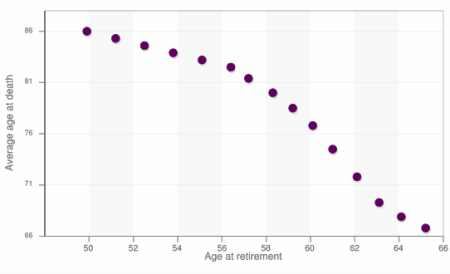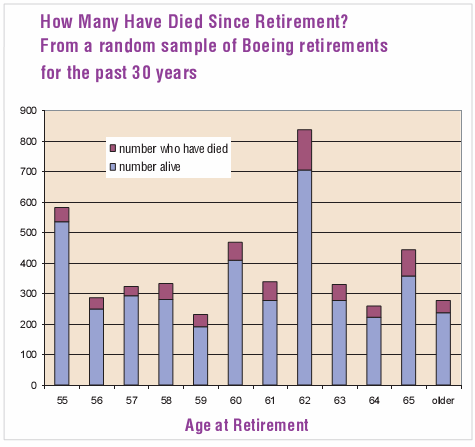Retiring early means a longer life - an urban myth?
By Murray Bourne, 22 Oct 2007
Every now and then you get an email that presents an interesting idea, but on further thought, you realise there is more to the story. When someone here in Singapore presented the information as fact in a talk recently, I thought it needed further investigation.
Apparently there was an actuarial study carried out by Boeing that showed a strong (negative) correlation between age of retirement and life expectancy. That is, if you retire early, you will live a long time and if you work right up to the maximum (65 in many countries), you will die soon after you retire.
Dr Sing Lin, a faculty member of the King Faud University of Petroleum and Minerals (Saudi Arabia) wrote about the study in Optimum Strategies for Creativity and Longevity. He includes tables from the study by Dr. Ephrem (Siao Chung) Cheng and states:
The study was based on the number of pension checks sent to retirees of Boeing Aerospace.
People want to believe this kind of thing, so they send it on to their friends hoping to cheer themselves up.
Citing the article by Sing, this Swivel graph by Emil Valdez shows the supposedly strong correlation:

[Source no longer available]
Some immediate responses that I had to this story:
- Restricted sample: When was the data gathered? How many people were involved?
- Personal opinions: This is not an academic paper by Dr Sing Lin, rather, it is an opinion piece, and quite possibly wishful thinking. There are no references given for the data or for anything else mentioned in the article.
- Reasons for correlation: It is possible that those who retire earlier are wealthier and have better access to higher quality medical care
- Stress effects: Perhaps retiring earlier means you are less stressed and so you live longer.
But the data did not add up. It was too neat and had scant authority. So I did some digging.
An article in Freiburg-Schwarzwald.de pointed out that the Boeing data is 25 years old. If so, this brings up more issues - how far back does the data go? What effect does increasing longevity have on the data?
From the Authentic Source
In Boeing’s "Let’s Retire the Rumor about Life Expectancy" [PDF, no longer available] we have the statement:
There is no correlation between age at retirement and life expectancy of Boeing retirees.
There is also a chart in that PDF document outlining actual retirement longevity data from Boeing.

Actually, this graph also needs some interpretation. What does "number alive" actually mean? If you retired at 50 and it was 30 years ago, then you could expect that you don’t have long to go. If you have only just retired, you would certainly expect to "be alive". It says "a random sample" - but is it the same number for each age cohort? And how long ago did each person retire? Is it also evenly distributed?
Getting back to the main issue, their statement on the background to the false correlation matter is clear:
The first inaccurate life expectancy chart surfaced in the early 80s, and versions of it have been floating around for years − almost as an “urban myth.” The Internet now spreads the misinformation farther, faster, and in a more professional-appearing form. Boeing and many other companies have tried to dispel the misconception. Unfortunately, the bad news − even though it is fiction − catches people’s attention, while the good news (that Boeing employees generally live longer than the national average), is accurate but often overlooked.
So, as usual, be careful what you read.
See the 8 Comments below.
3 Jun 2011 at 4:26 am [Comment permalink]
[...] Originally Posted by Phuz With the decision of retirement facing thousands of Major pilots this month here is some data worthy of discussion: Your chart is an urban legend. See: Retiring early means a longer life - an urban myth? :: squareCircleZ [...]
17 Nov 2011 at 1:42 pm [Comment permalink]
I recall in the mid to late 1990's when Management at Douglas Aircraft issued this chart in an attempt to get senior employees to retire, making way for a younger work force. As a former union rep I got many calls from this document, As stated above Boeing later came in and retired the chart as made up by ????.
30 May 2012 at 11:06 am [Comment permalink]
[...] much shorter than that of our current generation of working people in the 21st century. and Retiring early means a longer life ***8211; an urban myth? :: squareCircleZ [...]
26 Jul 2012 at 2:18 am [Comment permalink]
This paper, which seems to be well researched, concludes that the opposite is true. The later you retire, the longer you live.
http://www.ssa.gov/policy/docs/workingpapers/wp93.pdf
26 Jul 2012 at 9:52 am [Comment permalink]
Thanks for the paper, Sven. I feel they glossed over the health issue. If you are not so well, you are more likely to retire early and die early, surely?
But yes, better researched than the urban myth, for sure!
15 Mar 2013 at 8:57 pm [Comment permalink]
[...] Nonsense. Retiring early means a longer life - an urban myth? :: squareCircleZ [...]
9 Oct 2014 at 12:30 pm [Comment permalink]
[…] Does it look suspicious to you? […]
8 Jul 2019 at 9:11 am [Comment permalink]
I stared to connect the dots when I was 10 living in settle I had older parents who had much older friends retire about early 60s, drop dead. now at 74 I been analyzing my high school website It list who died when and from what yes numbers don,t lie from executives to factory workers half at least 60% of my classmates died just before or after retirement at 65Huge spike died between 50-60 mostly executive type carreers I dicern some measure of denial among bloggers who retired younger. but one cant outsmart boeing at this gamble.they will always win